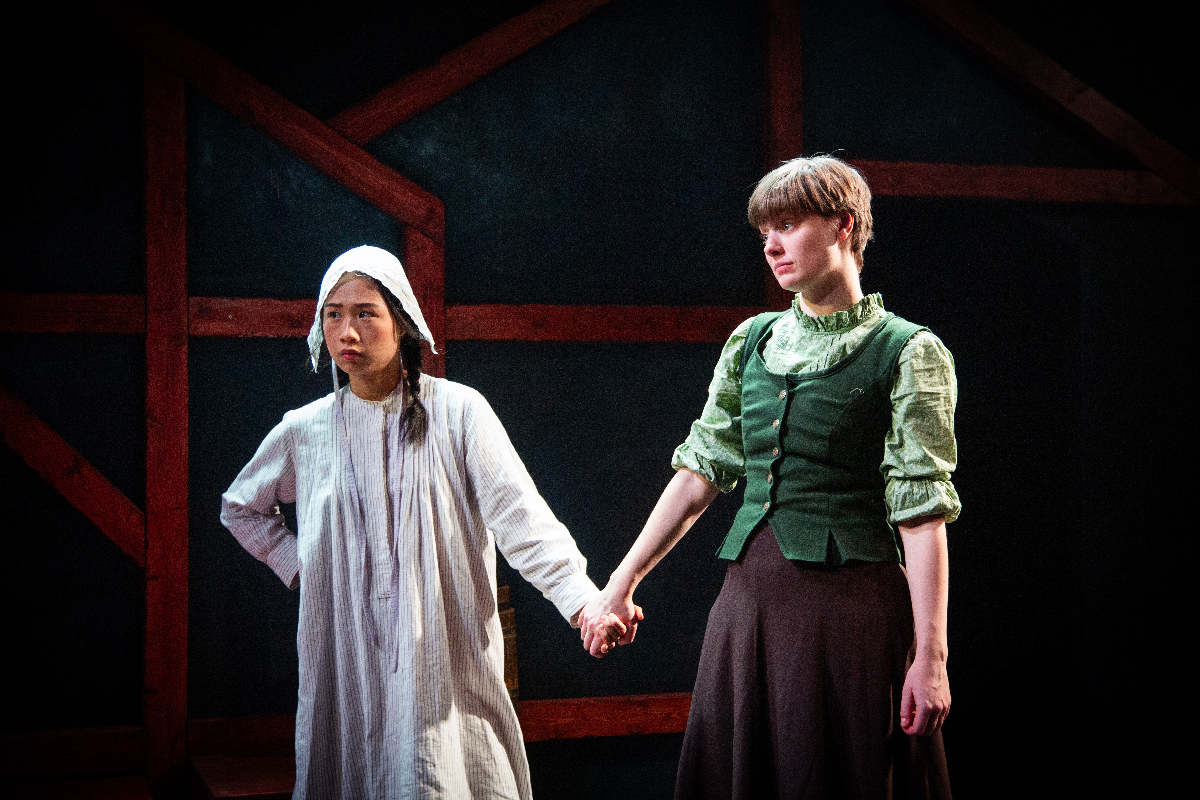It is no surprise that the phrase “Witch Hunt” is Donald Trump’s favoured term to describe his legal travails. Leaving aside its connotations of a malevolent state going after an innocent victim whilst in the throes of a self-serving moral panic, it plays into a founding psychodrama of the USA - the Salem Witch Trials of 1692.
Arthur Miller’s play based on those events, The Crucible, is now embedded in the high school curriculum keeping the flame alive, so it makes sense for Talene Monahon to write a prequel from a feminist perspective and, after a run in New York, it has reached the London stage.
We’re in New England a year before the infamous trials, in the company of two cousins, Abigail, about to turn 12, and Betty, nine. They bicker as they churn butter in bonnets, and we soon see that they’re doubly neglected - the elder is an orphan, the younger barely sees her parents, and Puritanism has hammered all the joy from their lives. Abigail longs for an expanded physical world, leaping at the chance to work as a servant in a nearby household, while Betty’s vivid imagination takes her to interior worlds teeming with delights and dangers. Two older girls come into their lives. Mercy is 14 and tells them tales of sex (we later find out how she came about such information), Abigail, on the brink of puberty, particularly keen to listen. Mary is 18, prone to epilepsy, and fascinates Betty with her secrets from the woods, the forbidden place, in sight but out of reach, vested with mystery and temptation. Transgression was as seductive then as it is today, more so in the repressive world to which the girls were restricted. Their explorations beyond those cruel boundaries were to set in train the events that culminated in executions just a year or so later.
Two older girls come into their lives. Mercy is 14 and tells them tales of sex (we later find out how she came about such information), Abigail, on the brink of puberty, particularly keen to listen. Mary is 18, prone to epilepsy, and fascinates Betty with her secrets from the woods, the forbidden place, in sight but out of reach, vested with mystery and temptation. Transgression was as seductive then as it is today, more so in the repressive world to which the girls were restricted. Their explorations beyond those cruel boundaries were to set in train the events that culminated in executions just a year or so later.
All four performances are strong, holding our attention for a demanding 100 minutes or so, all-through, in a seat whose comfort level might have pleased a preacher or two from the 1690s.
As Betty, Sabrina Wu (pictured above with Anna Fordham) captures the incessant wonder, the instant movements, the 0 to 100 mph psychological and physical life of a bright, thwarted kid. Anna Fordham has more character work to do as Abigail, the girl who longs to be a woman, who rails against the domestic life indoors and defies tradition by doing ‘boy work’ in the fields, but is subjected to too much too young, adding irony to the play’s title and pointedly challenging Miller’s narrative line.
Amber Sylvia Edwards’ Mercy swaggers as she swigs cider flaunting the extra two years she has on Abigail, but her continual talk of The Devil as a real presence in the village, doing real things to real girls, speaks to the abuse she has suffered. Lydia Larson imbues Mary with an ethereal otherness, a benign companion whose apparent harmlessness is undermined by her carrying a knife and who, when she gets a chance, shows a genuine interest in what might now be called the Occult and an indifference to its threat.
It’s laudable that the play gives voice to the girls at the heart of the story that Miller mined for his allegorical drama, but Monahon goes beyond that, adding speculation concerning child abuse and rape. That is her right as the author and nobody should ever expect such fictionalisations of history to come with footnotes and peer reviews in the citations. Along with the regular use of 21st century language, it does catapult the play into a contemporary moral space, but I suspect that would always happen anyway.
Though director Anna Ryder keeps the pace up (aided by super sound work from Bella Kear) the drama is wordy and hobbled by not one, but two scenes in a coda set years later that tidies up the storylines but saps the youthful energy that had sustained the play for the previous 90 minutes or so.
Ultimately, it all feels a little distant in place, but also in psychology. Witch hunts (though we had them in the UK, infamously in Lancashire in the early 17th century) are less vividly recalled in this country, more likely to provoke memories of late night Hammer movies on the BBC or Hermione Granger than a mythos of emerging statehood. Evangelical Christianity too, is less prominent in life, the Church of England sometimes described as the world’s only secular religion, more interested in being polite and promulgating rituals like tea and buttered scones at 4pm than all that fire and brimstone stuff.
Walking out of the theatre into Piccadilly Circus’s half-hearted mimicking of New York’s Times Square, I was reminded that not everything retains its power during the 3000 miles crossing of the Atlantic Ocean.















Add comment